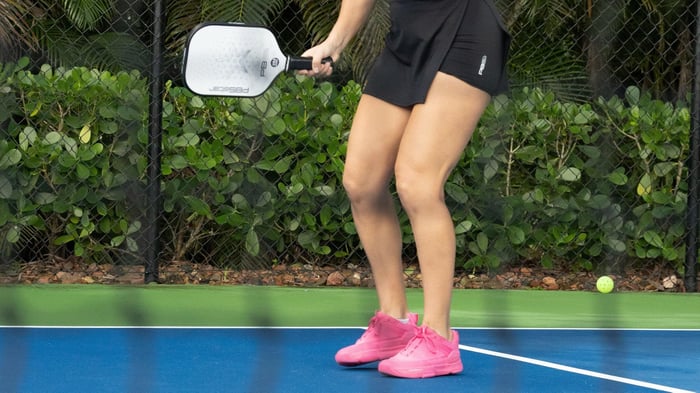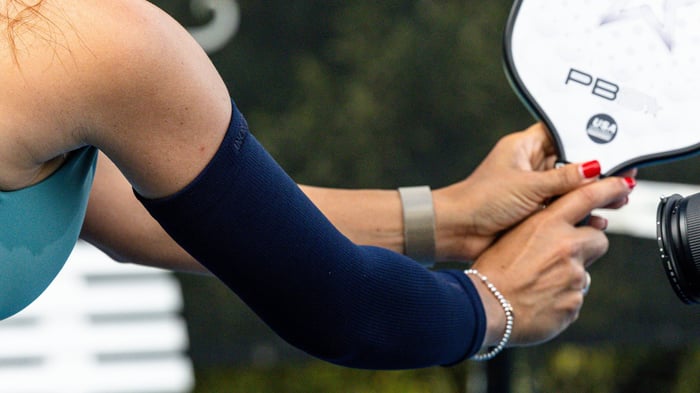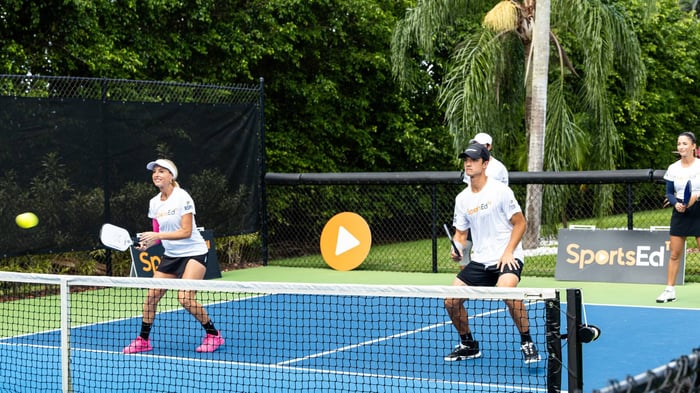Key takeaways:
Pressure is a sign of progress. Hannah Blatt reframes pressure as a privilege—proof that you’ve earned your spot and an opportunity to grow, win or lose.
Reset routines keep you grounded. From deep breaths and towel breaks to personal reminders like her wrist tattoo, Hannah uses simple tools to regain focus during tough moments.
Trusting your preparation builds confidence. Belief in the work you’ve put in is what allows you to play freely and stay present, even when the stakes are high.
As a professional pickleball player, I've learned that the mental game can be the deciding factor in high-stakes matches. The transition from squash to pickleball taught me valuable lessons about managing the emotional and mental demands that come with elite-level competition. Today, I want to share the personal strategies I've developed for handling pressure on the court—from building mental routines to leaning on perspective and preparation.
My approach is built on one core belief that has transformed how I compete: "Pressure is a privilege."
This mindset—rooted in self-awareness, structure, and trust—serves as the foundation of how I prepare, perform, and reset during challenging moments on the court.
My core philosophy: Pressure is a privilege
Handling pressure starts with how you view it. One of my favorite quotes that has become central to my mindset is: "Pressure is a privilege." This phrase helps me reframe those tense moments on court—not as something to fear, but something I've earned through hard work and commitment.
When I feel pressure, I remind myself that I've earned it—I've earned that spot. It's a reminder that nerves are natural, but they don't have to control the outcome. There's no need to be nervous. Even in the toughest matches, I see opportunities to grow. The result can be positive or negative, and I'll always learn something new whether I win or lose.
This perspective shapes how I approach every match. Instead of focusing solely on the outcome, I stay grounded in the belief that showing up and competing at a high level is a privilege in itself. That shift allows me to stay composed, reset when needed, and keep moving forward—win or lose.
Building stability through routine
When it comes to staying focused in high-pressure matches, I rely heavily on routine. During high-pressure matches, I think it's really important that you have a routine that you can get into. For me, it's not just about physical preparation—it's about creating a rhythm that helps settle my nerves and creates mental clarity.
My go-to routine elements:
Pre-match warm-up sequence - I follow the same physical preparation every time
Water bottle breaks - Simple but consistent touchpoints during play
Familiar movements - Repeated actions that help me stay centered when things feel overwhelming
My routine isn't just about getting ready to play—it's also about creating space to reset. When things aren't going my way, I lean on these familiar behaviors to regain control and confidence. The goal is to allow myself to play freely and trust the work and the process that I've put in to get to where I am. That trust becomes my anchor when the pressure hits.
My on-court reset tools
When momentum shifts or pressure peaks mid-match, I have a personal reset routine that helps me regain focus. Here's what works for me:
Physical reset techniques:
Take a strategic pause - I typically take a second, whether that be a timeout or I go into the corner
Grab my towel - This gives me a physical anchor and something familiar to focus on
Deep breathing - I take a couple of deep breaths to break from the pace and re-center mentally
My most meaningful reset: The wrist tattoo
But my most powerful reset cue comes from something deeply personal—a tattoo on my left wrist. It reminds me of my grandma, who was always very into my sports. The tattoo is also a connection to my mom and sister, who share the same design.
For me, it's more than a symbol—it's perspective. It's just a reminder that there's more to life than just this game, and that I'm fortunate and healthy to be able to be where I am on the court competing.
This personal connection helps me zoom out during tough moments. It's not about ignoring the competition, but about remembering what matters—and using that clarity to reset with purpose.
Balancing visualization with presence
Visualization plays a key role in my mental preparation, especially when the pressure is on. Obviously, I like to visualize my strokes and the points. By picturing myself executing the right shots, I create a mental script for success before stepping into action.
But just as important as visualization is staying grounded in the present moment. I'm careful not to let my thoughts race too far ahead. I try to not get ahead of myself and stay in the reality of the moment. That balance—seeing what I want to happen while staying rooted in what's actually unfolding—helps me manage nerves and stay focused.
This combination of mental rehearsal and present-moment awareness keeps me calm, clear, and in control. It's not about predicting every outcome—it's about preparing mentally while keeping my attention on the point in front of me.
Drawing energy from my support system
When high-pressure moments start to build, I don't just rely on internal strategies—I also draw energy from the people around me. Sometimes when things get really intense and if I'm unable to calm myself, I like to look at someone that's there supporting me or watching.
That small act—making eye contact or just seeing a familiar face—can bring me back to a calmer mindset. I use their energy as momentum or a bit of comfort. It's not about distraction; it's about reassurance. That support reminds me to trust in my abilities and focus on what I'm doing in the moment.
Whether it's a friend, coach, or family member on the sidelines, I tap into their presence as a mental reset. It's a reminder that I'm not alone—and that belief in myself is mirrored by others who are rooting for me.
Working through mental blocks
Even as a professional athlete, mental blocks happen to me. That's something that I'm still working on at times. A mental block is obviously a block for a reason, and it's not always easy to push through—but recognizing when I'm in one is the first step toward breaking it.
My approach to mental blocks:
Don't force it - I avoid trying to power through when I'm stuck
Make small adjustments - Sometimes a tiny change in approach can shift everything
Return to reset tools - I go back to my established techniques like breathing or my towel routine
Trust the preparation - I remind myself that the work I've done will carry me through
At the heart of my strategy is trust—trust in the training and work I've put in. I just kind of bring myself back to trusting that the work that I've done leading up to this moment is what will get me to the next step. It's a mindset built on preparation and belief, even in moments of doubt.
Staying self-aware and motivated
The one biggest thing is making sure that you're aware of your mindset, of your capabilities, of what you're doing. That level of awareness helps me recognize when something's off and gives me space to respond.
Keys to consistent motivation:
Acknowledge the dips - I admit there are moments when my motivation wavers, especially during long tournaments
Lean into discipline - Finding a way to motivate yourself when you're unmotivated is crucial
Focus on the process - Just getting the job done and staying positive while doing it keeps me consistent
Stay self-aware - Know what you're capable of and keep moving forward, even when the spark isn't there
That steady, positive mindset has helped me navigate the highs and lows of competition and maintain my edge under pressure.
Trust the work, embrace the moment
Handling pressure on the pickleball court isn't about eliminating nerves—it's about knowing how to respond to them. My approach shows that preparation, mindset, and small resets can make all the difference when the game gets intense. Whether it's a personal routine, a grounding reminder, or a shift in perspective, my strategies come back to one core principle: trust the process.
Trusting the work and the process that I've put in to get to where I am helps a lot—and that trust builds the confidence to compete freely, even under pressure. My advice is practical, honest, and rooted in experience. You don't have to be perfect—you just have to stay present, stay positive, and keep showing up.
I'm proud to be supported by PB5star, a company that understands the importance of focus, resilience, and deep love for the game. I hope my insights help you show up strong in your own high-pressure moments—because pressure isn't something to avoid. It's something you've earned.
FAQs
How can I keep calm under pressure during a pickleball match?
Try reframing pressure as a sign of progress, not something to fear. Pressure means you've earned your spot and have a chance to grow. Embrace it as a privilege and focus on your preparation; it'll keep you grounded and present during intense moments.
What are some effective routines to manage nerves before a game?
Develop a pre-match routine that includes physical warm-ups and mental checkpoints. Consider practices like consistent water breaks and familiar movements to create a rhythm. These rituals may help settle nerves and establish mental clarity before and during the game.
How do visualization and staying present help improve my game?
Visualization primes your mind for success by mentally rehearsing the shots you want to execute. Combine this with staying present by focusing on the current point rather than future outcomes. This balance keeps your nerves in check and helps you stay focused.
How can I use support systems to handle competitive stress?
When pressure builds, draw energy from supporters around you. A simple glance at a familiar face or a quick moment of encouragement can remind you to trust your abilities. It's about reassurance, not distraction, reinforcing that you're not alone in your efforts.







